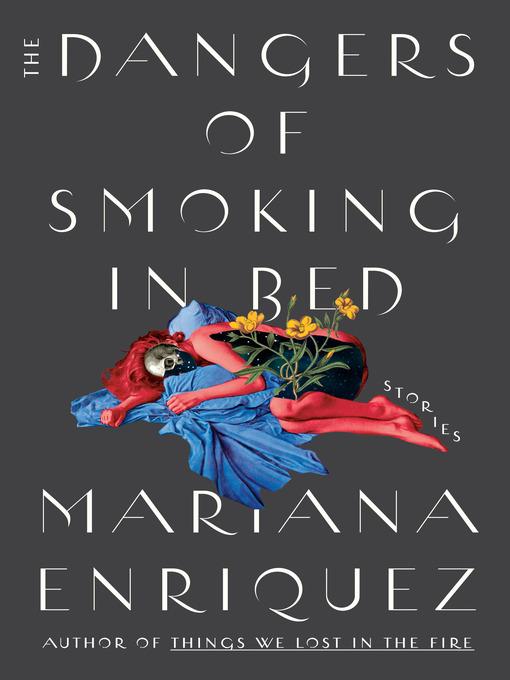
The Dangers of Smoking in Bed
Stories
کتاب های مرتبط
- اطلاعات
- نقد و بررسی
- دیدگاه کاربران
نقد و بررسی

Starred review from October 26, 2020
The alleys and slums of Buenos Aires supply the backdrop to Enriquez’s harrowing and utterly original collection (after Things We Lost in the Fire), which illuminates the pitch-dark netherworld between urban squalor and madness. In the nightmarish opener, “Angelita Unearthed,” the bones of a rotting child reanimate after being dug up; likewise, in “Back When We Talked to the Dead,” the dead foretell dread using a Ouija board. Themes of obsession and the arcane come to light in “Our Lady of the Quarry,” where a band of teenage girls turn to witchcraft to snare the object of their desires; “Meat,” which follows two grave-robbing fans of a recently deceased rock star; and “Where Are You, Dear Heart?”, in which a self-described “heartbeat fetishist” gets off by holding a stethoscope to a diseased man’s chest. Things grow darker still in “Rambla Triste,” as the victims of a pedophile ring are resurrected in Barcelona as “incarnations of the city’s madness,” and in “Kids Who Come Back,” the book’s epic and visceral centerpiece, in which the missing, damned, and destitute begin returning home. (Which isn’t to discount the grotesque title story or the exorcism at the heart of “The Well.”) Finally, there are the pair of film fanatics who undertake made-to-order pornography only to quickly get in over their heads in “No Birthdays or Baptisms.” Enriquez’s wide-ranging imagination and ravenous appetite for morbid scenarios often reaches sublime heights. Adventurous readers will be rewarded in these trips into the macabre—and hopefully they’ll be able to find their way back.

November 15, 2020
Twelve gruesome, trenchant, and darkly winking stories set in modern-day Buenos Aires, Barcelona, and Belgium. One of the great advantages of genre fiction is its ability to use metaphor and distortion to explore realities that may otherwise feel too large or terrible to confront head-on. Enr�quez, a journalist who grew up in Buenos Aires during Argentina's Dirty War--a trauma that echoes across these stories--is a pioneer of Argentinian horror and Spanish-language weird fiction, warping familiar settings (city parks, an office building, a stretch of neighborhood street) by wefting in the uncanny, supernatural, or monstrously human. Drawing on real places and events and spinning them out in fantastical ways, she disinters the darkness thrumming under the smooth, bureaucratized surface of urban life, exposing powerlessness, inequity, abuse, and erasure. Colonial Catholicism, pop culture, grotesquerie, and local legends intertwine in images of rotting flesh, altars that conceal their true nature, and ritual magic while themes of loss, fate, mental illness, state violence, fear and disdain for the other, and familial obligation--both the abnegation and upholding thereof--run throughout. In "Angelita Unearthed," a young woman lives with an unexpected burden of inherited grief. "Rambla Triste" introduces us to a woman visiting old friends in Barcelona who is soon confronted by a potent and inescapable reminder of the neighborhood's tragic, buried--and questionably authentic--past. In one firecracker, "Our Lady of the Quarry," a volatile mix of teenage vanity, jealousy, and rage leads to a summoning of dark powers and disproportionate revenge. And in the creepy and desolating "Kids Who Come Back," the lost, sold, and rejected children of Buenos Aires begin to return, sparking dubious joy out of even more dubious grief and exposing an entire populace steeped in guilt but determined to reject its culpability. As entertaining as it is affecting and channeled into English with almost clairvoyant percipience by translator McDowell, this is one not to be slept on for enthusiasts of weird fiction and literary horror and of writers like Samanta Schweblin, Amber Sparks, Ayse Papatya Bucak, and Carmen Maria Machado. An atmospheric assemblage of cunning and cutting Argentine gothic tales. Insidiously absorbing, like quicksand.
COPYRIGHT(2020) Kirkus Reviews, ALL RIGHTS RESERVED.

December 1, 2020
Author of the otherworldly story collection Things We Lost in the Fire (2017), Enriquez returns with another book of short stories, each one equally breathtaking, off-kilter, even deranged. ""The Cart"" features a cursed shopping cart, ostensibly stolen from a supermarket and abandoned by the side of the road. The unlucky neighborhood's denizens quickly find themselves out of work, unwell, and dying off, until the narrator's neighbors resort to roasting human flesh. While Enriquez's indelible images will sear themselves into readers' memories, it's her straightforward delivery and matter-of-fact tone that belie the wild, gasp-worthy action unfolding on the page. This makes for surprising, occasionally gut-wrenching reading. In ""Meat,"" a punk rocker on the verge of international stardom commits suicide in an unspeakably gruesome fashion. Two young women obsessed with him spend a night by his grave, becoming one with their idol. The collection's titular story is also its shortest, an odd vignette of a lonely woman who taunts moths with cigarette smoke. The story arrives right near the end of the collection, a fittingly strange peg for these unusually horrifying tales.
COPYRIGHT(2020) Booklist, ALL RIGHTS RESERVED.

























دیدگاه کاربران